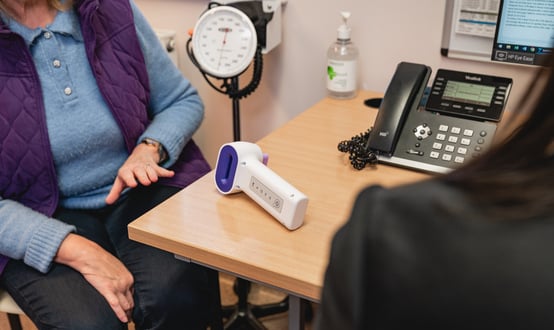Northumbria trials stroke rehab robot
- 10 July 2014

Northumbria Healthcare NHS Foundation Trust has started a five-year clinical trial of rehabilitation robots to help stroke patients regain movement in their arms.
The trust is working with researchers at Newcastle University and other UK institutions after receiving a £3m grant from the National Institute for Health Research.
The trial, uses “stroke rehabilitation robots” from the Massachusetts Institute of Technology in the United States.
Helen Rodgers a consultant stroke physician at the trust, who is leading the research, told EHI the purpose of the robots is to provide an easier and more effective rehabilitation process for patients and therapists.
During robot-assisted rehabilitation, a stroke patient places their arm onto the device while sitting at a table facing a computer screen.
The computer then displays a series of games to get the patient to move their arm, by moving a cursor between targets on the screen.
The robot assists patients who cannot move their arm themselves, adjusting the level of assistance depending on the patient’s own arm movements to help rebuild the connection between their brain and arm.
Rodgers said the emerging evidence about robot-assisted rehabilitation is “very encouraging”, as it enables more repetition of movement than with human assistance and allows the patient and therapist to focus on other important areas.
“It allows the patient to concentrate on their efforts and not on the person who’s moving their arm and the therapist can look at how the patient is progressing and make adjustments.”
Rodgers said the robots offer the potential for patients to “book themselves in” for supervised therapy if they are available in hospitals or clinics.
“Some centres have robots already, whole robot gyms where you can come in and have robot-assisted therapy with a supervisor.”
Dr Hermano Igo Krebs, principal research scientist and lecturer at MIT, said using robotics helps clinicians to get a better understanding of the neuro-recovery process while also “[building] a rich stream of data that assists in ongoing patient diagnosis and customisation of the therapy”.
The trial will involve over 700 stroke patients at up to 16 NHS stroke services focused on four major study centres in North Tyneside, Romford, Cambridge and Glasgow.
Rodgers said the researchers started to recruit patients in April, with participants needing to have moderate or severe difficulty moving their arm and be between one week and five years since their stroke.
Participants are randomly allocated into one of three groups for a three-month therapy period, with one receiving the robot-assisted training, one receiving the equivalent intensive therapy from a therapist, and the third receiving usual NHS therapy treatment.
Rodgers said participants will have their arm function tested at three months and again at six months to see which therapies have had lasting effects.
The centres will work with local hospitals, community rehabilitation services, stroke clubs and GP practices on the project.



